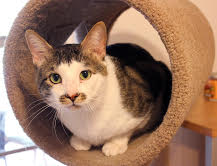For decades, Feline Immunodeficiency Virus (FIV) positive cats basically faced two fates: euthanasia, or a lifetime without a forever home. Due in part to a lack of conclusive studies on the virus, and made all the worse by the stigma associated with other immunodeficiency viruses, the public had long been convinced that FIV+ cats could only live with other FIV+ cats, which made placing these cats into homes nearly impossible.
Fortunately, recent veterinary studies, a growing appreciation of special needs cats, and a new interest in addressing behavioral issues in felines have revealed that these cats can in fact live long, healthy lives in the company of FIV negative cats with no issue.
So here’s everything you need to know if you’re thinking about opening up your heart and home to one of these felines! (spoiler alert: they are awesome.)
What is FIV?
FIV is a viral disease in the same class as HIV. It suppresses the immune system of the infected cats, causing an increased risk of complications (infection, prolonged sickness, etc.) from other illnesses. Between 1.5 and 3% of healthy cats are believed to be FIV positive.
What are the symptoms of FIV and how is it diagnosed?
Cats living with FIV tend to have no symptoms. However, because the virus suppresses the immune system, the cat is at greater risk for complications from secondary infections and illnesses.
FIV is diagnosed using a SNAP test, or a combo test when testing for both FIV and FeLV (Feline Leukemia Virus). This is a simple blood test that tests for the presence of FIV antibodies created as the result of an infection. Chances are most of your cats were tested using this method at their first vet visit or at the shelter.
How do cats contract FIV?
FIV is transmitted via deep bites via the saliva of the infected cat. It has to be a really, really, really deep bite. As such, free-roaming males in search of a mate are the most likely population to contract FIV.
Cats cannot contract FIV via shared litterboxes, food bowls, grooming or any other casual contact. Even play-fighting is fine as long as a deep bite is not delivered (which, to be fair, basically never happens… and if it does, it wasn’t play-fighting to begin with).
Furthermore, a recent study has shown that transmission from nursing mother to kittens is also unlikely.
How long do FIV cats live?
FIV cats can live long, healthy lives comparable to their FIV negative counterparts. Although they are more susceptible to Upper Respiratory Infection, dental disease and other secondary problems, FIV cats who live indoors, are fed a high-quality diet and receive regular veterinary care should be just fine.
Can FIV cats safely cohabitate with non-FIV cats?
Yes, yes and yes! A recent study published in The Veterinary Journal by Annette L. Litster of Purdue University’s College of Veterinary Medicine’s Department of Veterinary Clinical Sciences followed a population of 130 FIV negative and 8 FIV positive cats at a rescue in which all cats cohabitated together. If the virus were highly transmittable, surely some of the 130 negative cats would contract the virus through casual contact (sharing boxes, sharing food bowls, grooming, playing, etc.), but in both instances where the researcher checked the cats, no new incidences of FIV had occurred. The populations of FIV negative and FIV positive cats had remained unchanged.
This study confirms what rescuers and cat lovers had long suspected: that except through a deep bite, there is little to no chance that FIV will be transmitted.
Can I get FIV from my cat?
No. Absolutely, positively not. No. No, no, no, no, no. No!
What should I do if I want to adopt an FIV cat but have a negative cat at home?
FIV cats make great family members. As we mentioned, FIV is almost exclusively transmitted via a deep bite wound, so proper introductions (slooooooooowly) and supervision are absolutely essential. You don’t want ANY cats who could be great friends to get off on the wrong foot. If you need some help introducing your cats, please just let us know!
And if your resident cat is aggressive, it may not be safe to bring home another cat, FIV or otherwise, at this time. However, aggression usually has a cause, so please reach out to a veterinarian and a qualified cat behaviorist to address the problem.
FIV cats make great additions to your feline family and can live a long, healthy life at no risk to your other cats. Nearly every rescue has an FIV cat (or more) patiently waiting for that special person to give it a second chance. Consider opening your heart to one of these special kitties today!
Resources:


















